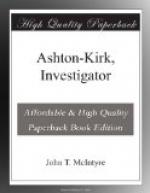PENDLETON CALLS UPON ASHTON-KIRK
Young Pendleton’s car crept carefully around the corner and wound in and out among the push-cart men and dirty children.
About midway in the block was a square-built house with tall, small-paned windows and checkered with black-headed brick. It stood slightly back from the street with ancient dignity; upon the shining door-plate, deeply bitten in angular text, was the name “Ashton-Kirk.”
Here the car stopped; Pendleton got out, ascended the white marble steps and tugged at the polished, old-fashioned bell-handle.
A grave-faced German, in dark livery, opened the door.
“Mr. Ashton-Kirk will see you, sir,” said he. “I gave him your telephone message as soon as he came down.”
“Thank you, Stumph,” said Pendleton. And with the manner of one perfectly acquainted with the house, he ascended a massively balustraded staircase. The walls were darkly paneled; from the shadowy recesses pictured faces of men and women looked down at him.
Coming in from the littered street, with its high smells and crowding, gesticulating people, the house impressed one by its quiet, its spaciousness, and the evident means and culture of its owner. Pendleton turned off at the first landing, proceeded along a passage and finally knocked at a door. Without waiting for a reply, he walked in.
At the far end of a long, high-ceilinged apartment a young man was lounging in an easy-chair. At his elbow was a jar of tobacco, a sheaf of brown cigarette papers and a scattering of books. He lifted a keen dark face, lit up by singularly brilliant eyes.
“Hello, Pen,” greeted he. “You’ve come just in time to smoke up some of this Greek tobacco. Throw those books off that chair and make yourself easy.”
One by one Pendleton lifted the books and glanced at the titles.
“Your morning’s reading, if this is such,” commented he, “is strikingly catholic. Plutarch, Snarleyow, the Opium Eater, Martin Chuzzlewit.” Then came a host of tattered pamphlets, bound in shrieking paper covers, which the speaker handled gingerly. “’The Crimes of Anton Probst,’” he continued to read, “’The Deeds of the Harper Family,’ ‘The Murder of ——’” here he paused, tossed the pamphlets aside with contempt, sat down and drew the tobacco jar toward him.
“Some of the results of your forays into the basements of old booksellers, I suppose,” he added, rolling a cigarette with delicate ease. “But what value you see in such things is beyond me.”
Ashton-Kirk smiled good-humoredly. He took up some of the pamphlets and fluttered their illy-printed pages.
“They are not beautiful,” he admitted; “the paper could not be worse and the wood cuts are horrors. But they are records of actual things—striking things, as a matter of fact—for a murder which so lifts itself above the thousands of homicides that are yearly occurring, as to gain a place outside the court records and newspapers, must have been one of exceptional execution.”




